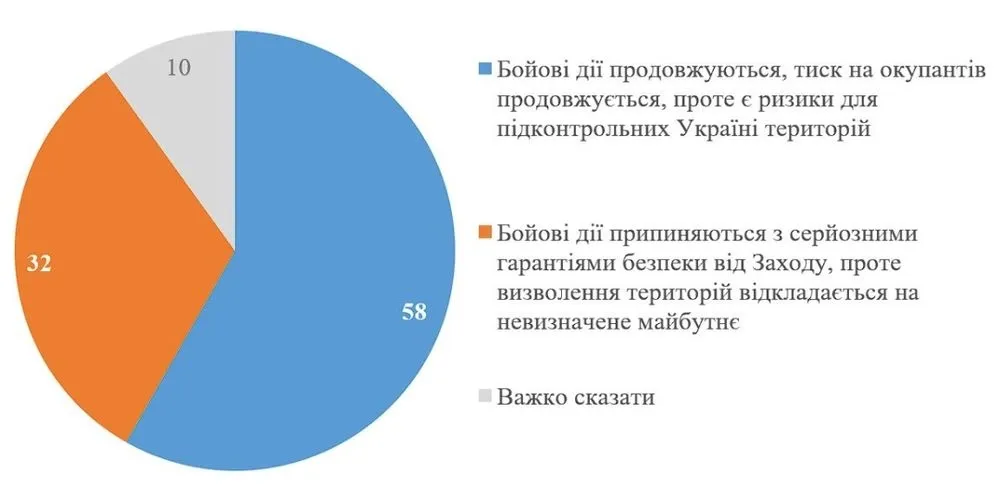Almost 60% of Ukrainians believe that it is necessary to fight with Russia even if Western aid is reduced - KIIS
Kyiv • UNN
The poll shows that 58% of Ukrainians favor continuing military action against Russia, even with reduced Western aid, while 32% would prefer to end it if serious security guarantees are provided. Regional opinions vary, with greater support for continuation in western and central Ukraine.

Most Ukrainians are inclined to believe that even in the event of a significant reduction in Western aid, it is still worth continuing hostilities to put pressure on the Russian occupiers, despite the risks to the territories controlled by Ukraine today. This is evidenced by the data of a sociological survey conducted by the Kyiv International Institute of Sociology (KIIS), UNN reports .
Details
According to the poll, the vast majority of Ukrainians - 87% - believe that if the West properly helps Ukraine with weapons, finance, and sanctions, Ukraine will be able to cause Russia's failures and achieve an acceptable result.
In particular, in the east the number is 79%, in the south - 85% (against 9% and 10%, respectively, who believe that Russia is too strong).
At the same time, due to the high risk of a significant decline in support from the West, KIIS asked respondents which of two conditional strategies would be better for Ukraine:
- hostilities cease. Ukraine retains control over the territories it currently controls, and the occupied territories are not officially recognized as part of Russia. The West provides Ukraine with serious security guarantees or even NATO membership. However, the liberation of the occupied territories is postponed for the indefinite future;
READ MORE: The situation is really difficult: expert on US aid to Ukraine
- the fighting continues. Ukraine continues to try to put pressure on the Russian occupiers and look for weaknesses that prevent them from consolidating their power in the occupied territory. There is also an opportunity to liberate the territories, albeit slowly, but gradually. But there is also a threat to the territories currently controlled by Ukraine.

The majority of respondents - 58% - are currently inclined to believe that even in the event of a significant reduction in Western aid, it is still worth continuing hostilities to put pressure on the occupiers, even taking into account the risks to the territories currently controlled by Ukraine. At the same time, every third respondent (32%) believes that it is better to stop hostilities under conditions of really serious security guarantees from the West, even if the liberation of the occupied territories is delayed indefinitely. The remaining 10% could not decide on their opinion
Addition
At the same time, according to sociologists, there are certain regional differences in the question of the strategy of actions in case of a significant reduction in Western aid. In the West and Center, more respondents (64% and 65%, respectively) are in favor of continuing the fighting in any case. However, in these regions, a significant share (a quarter of the population) also favored the cessation of hostilities.
SEE ALSO: EU summit will be very difficult, many discussions not only on Ukrainian issue - MFA
In the south and east, however, opinions are split roughly in half, with only a slight preponderance of opinion in favor of continuing hostilities. Thus, in the South, 46% and in the East, 47% believe that even with limited Western assistance, the fighting should continue. At the same time, 40% and 42%, respectively, are ready for the cessation of hostilities.
It should be noted that the factor of proximity to the front line plays an important role in this case. The south and east are much closer to the zone of active hostilities, which largely determines the higher readiness in the face of restrictions on aid to end hostilities - explained in KIIS.
Recall
In the US Senate blocked the emergency spending bill to provide billions of dollars in security assistance to Ukraine and Israel, as Republicans insisted on their demands for stricter immigration controls on the US-Mexico border.
Ukraine's Ambassador to the United States Oksana Markarova statedthat the US Senate would reintroduce the emergency aid bill for Ukraine.